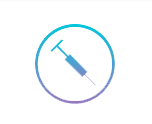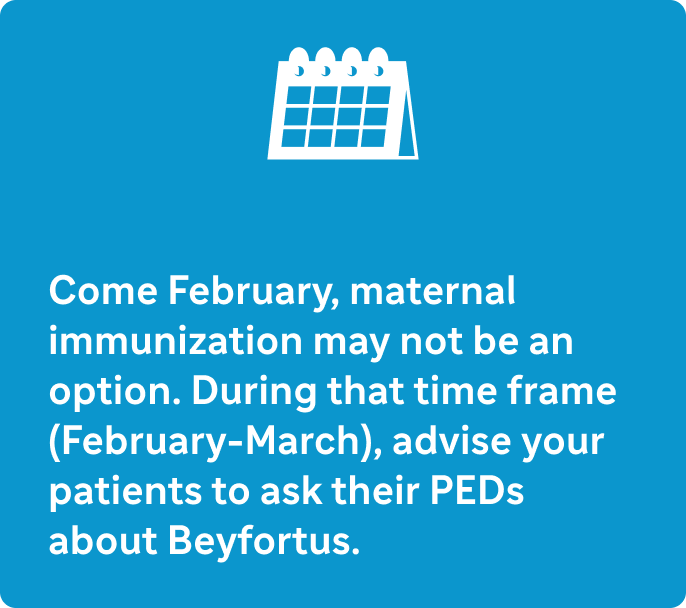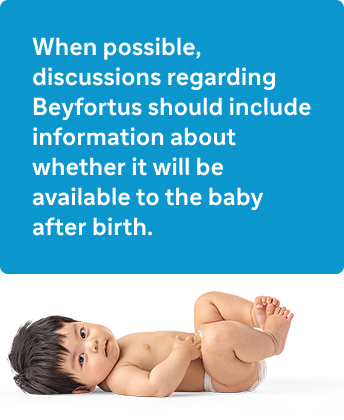Beyfortus® (nirsevimab-alip) is the first long-acting antibody that protects for the full respiratory syncytial virus (RSV) season1,2
About Beyfortus
Beyfortus is the first long-acting antibody indicated for the prevention of RSV lower respiratory tract disease in1:
- Neonates and infants born during or entering their first RSV season.
- Children up to 24 months of age who remain vulnerable to severe RSV disease through their second RSV season.

Fast-acting, passive immunization
Beyfortus is an antibody, not a vaccine, that helps prevent RSV disease in neonates and infants born during or entering their first RSV season.1,2

Protection through the RSV season
Beyfortus provides RSV disease protection through 5 months, the length of a typical RSV season, based on clinical data.1,2*

Administered in the hospital or clinic after birth
Beyfortus can be given in the hospital within 1 week after birth to help protect against RSV disease.3
Although most of the time RSV will cause mild cold-like symptoms, we cannot predict which infants will develop RSV lower respiratory tract disease.4,5
*Time to maximum concentration is 6 days in adults, and uptake half-life is 1.7 days in infants.1,6

ACOG recommendations
ACOG guidelines state that clinicians should counsel patients regarding the monoclonal antibody—Beyfortus—as another option for newborns if the maternal RSV vaccine is not received during pregnancy.7*

Infants <34 weeks8
Infants born at <34 weeks should receive Beyfortus regardless of maternal vaccination status.

Infants at risk7,8
Infants born to mothers who received RSV vaccination ≥14 days before birth may still receive Beyfortus based on clinical judgment.
*Patient preferences for maternal vs infant immunization against RSV should be considered when deciding to administer Beyfortus.7

CDC/ACIP and AAP recommendations
First RSV season9,10
Infants aged <8 months born during or entering their first RSV season are recommended to receive 1 dose of Beyfortus (50 mg for infants <5 kg and 100 mg for infants ≥5 kg).
- Providers should target administration shortly before the start of the season for infants aged <8 months born before their first RSV season
- For infants born shortly before or entering their first RSV season, Beyfortus should be administered within 1 week of birth, which can be during the birth hospitalization or in the outpatient setting
CDC recommends administering Beyfortus to infants in specific months during their first RSV season based on RSV seasonality.3
Second RSV season9,10
Beyfortus is the only CDC-recommended option for children aged 8 to 19 months at an increased risk of severe RSV disease who are entering their second RSV season (1 dose of Beyfortus [200 mg administered as 2 IM injections 2 x 100 mg]).
- Providers should target administration shortly before the start of the season for children aged 8 to 19 months who are at an increased risk of severe RSV disease
Refer to the most current CDC immunization schedule for additional immunization considerations.
Beyfortus is recommended for infants aged <8 months born during or entering their first RSV season8,11*:
- Whose mother did not receive the RSV maternal vaccine
- Whose mother’s receipt of the RSV maternal vaccine is unknown
- Who were born <14 days after maternal vaccination
- Beyfortus may be considered for infants whose mother received the RSV maternal vaccine if, based on the clinical judgment of the healthcare provider, the potential incremental benefit of administration is warranted
- Current recommendations for 2024-2025 are for a single lifetime dose of the RSV maternal vaccine during pregnancy and that Beyfortus should be used for infants born to mothers who received the RSV vaccine during a previous pregnancy
CDC recommends administering Beyfortus to infants in specific months during their first RSV season based on RSV seasonality.3
Refer to the most current CDC immunization schedule for additional immunization considerations.
*Beyfortus is not needed for most infants aged <8 months whose mother received the RSV maternal vaccine ≥14 days before birth.12
- Beyfortus is the only CDC-recommended option for infants and children aged 8 to 19 months at an increased risk of severe RSV disease who are entering their second RSV season, including9:
- Children with chronic lung disease of prematurity who required medical support (chronic corticosteroid therapy, diuretic therapy, or supplemental oxygen) any time during the 6-month period before the start of the second RSV season
- Severely immunocompromised children
- Children with cystic fibrosis who have either:
- manifestations of severe lung disease (previous hospitalization for pulmonary exacerbation in the first year of life or abnormalities on chest imaging that persist when stable), or
- weight-for-length <10th percentile
- American Indian or Alaskan Native children
- Because the timing of the onset, peak, and decline of RSV activity might vary geographically, providers can adjust administration schedules based on local epidemiology9
- RSV seasonality in tropical climates (including Southern Florida, Guam, Hawaii, Puerto Rico, US-affiliated Pacific Islands, and US Virgin Islands) might differ
- In Alaska, RSV seasonality is less predictable, and the duration of RSV activity is often longer than the national average duration
- Providers in these jurisdictions should consult state, local, or territorial guidance on timing of Beyfortus administration
First RSV season9,10
Infants aged <8 months born during or entering their first RSV season are recommended to receive 1 dose of Beyfortus (50 mg for infants <5 kg and 100 mg for infants ≥5 kg).
- Providers should target administration shortly before the start of the season for infants aged <8 months born before their first RSV season
- For infants born shortly before or entering their first RSV season, Beyfortus should be administered within 1 week of birth, which can be during the birth hospitalization or in the outpatient setting
CDC recommends administering Beyfortus to infants in specific months during their first RSV season based on RSV seasonality.3
Second RSV season9,10
Beyfortus is the only CDC-recommended option for children aged 8 to 19 months at an increased risk of severe RSV disease who are entering their second RSV season (1 dose of Beyfortus [200 mg administered as 2 IM injections 2 x 100 mg]).
- Providers should target administration shortly before the start of the season for children aged 8 to 19 months who are at an increased risk of severe RSV disease
Refer to the most current CDC immunization schedule for additional immunization considerations.
Beyfortus is recommended for infants aged <8 months born during or entering their first RSV season8,11*:
- Whose mother did not receive the RSV maternal vaccine
- Whose mother’s receipt of the RSV maternal vaccine is unknown
- Who were born <14 days after maternal vaccination
- Beyfortus may be considered for infants whose mother received the RSV maternal vaccine if, based on the clinical judgment of the healthcare provider, the potential incremental benefit of administration is warranted
- Current recommendations for 2024-2025 are for a single lifetime dose of the RSV maternal vaccine during pregnancy and that Beyfortus should be used for infants born to mothers who received the RSV vaccine during a previous pregnancy
CDC recommends administering Beyfortus to infants in specific months during their first RSV season based on RSV seasonality.3
Refer to the most current CDC immunization schedule for additional immunization considerations.
*Beyfortus is not needed for most infants aged <8 months whose mother received the RSV maternal vaccine ≥14 days before birth.12
- Beyfortus is the only CDC-recommended option for infants and children aged 8 to 19 months at an increased risk of severe RSV disease who are entering their second RSV season, including9:
- Children with chronic lung disease of prematurity who required medical support (chronic corticosteroid therapy, diuretic therapy, or supplemental oxygen) any time during the 6-month period before the start of the second RSV season
- Severely immunocompromised children
- Children with cystic fibrosis who have either:
- manifestations of severe lung disease (previous hospitalization for pulmonary exacerbation in the first year of life or abnormalities on chest imaging that persist when stable), or
- weight-for-length <10th percentile
- American Indian or Alaskan Native children
- Because the timing of the onset, peak, and decline of RSV activity might vary geographically, providers can adjust administration schedules based on local epidemiology9
- RSV seasonality in tropical climates (including Southern Florida, Guam, Hawaii, Puerto Rico, US-affiliated Pacific Islands, and US Virgin Islands) might differ
- In Alaska, RSV seasonality is less predictable, and the duration of RSV activity is often longer than the national average duration
- Providers in these jurisdictions should consult state, local, or territorial guidance on timing of Beyfortus administration
AAP, American Academy of Pediatrics; ACIP, Advisory Committee on Immunization Practices; ACOG, American College of Obstetricians and Gynecologists; CDC, Centers for Disease Control and Prevention; IM, intramuscular; OB-GYN, obstetrician gynecologist; RSV, respiratory syncytial virus.
Resources
Beyfortus is not indicated for adults.
Important Safety Information
References: 1. Beyfortus (nirsevimab-alip). Prescribing Information. Sanofi. 2. Obando-Pacheco P, Justicia-Grande AJ, Rivero-Calle I, et al. Respiratory syncytial virus seasonality: a global overview. J Infect Dis. 2018;217(9):1356-1364. 3. Immunizations to protect infants. Centers for Disease Control and Prevention. Updated August 30, 2024. Accessed July 16, 2025. https://www.cdc.gov/rsv/vaccines/protect-infants.html. 4. Arriola CS, Kim L, Langley G, et al. Estimated burden of community-onset respiratory syncytial virus-associated hospitalizations among children aged <2 years in the United States, 2014-15. J Pediatric Infect Dis Soc. 2020;9(5):587-595. 5. RSV in infants and young children. Centers for Disease Control and Prevention. August 30, 2024. Accessed July 16, 2025. https://www.cdc.gov/rsv/infants-young-children/index.html 6. Clegg L, Freshwater E, Leach A, et al. Population pharmacokinetics of nirsevimab in preterm and term infants. J Clin Pharmacol. 2024;64(5):555-567. 7. Maternal respiratory syncytial virus vaccination. American College of Obstetricians and Gynecologists. Updated March 17, 2025. Accessed July 16, 2025. https://www.acog.org/clinical/clinical-guidance/practice-advisory/articles/2023/09/maternal-respiratory-syncytial-virus-vaccination 8. Fleming-Dutra KE, Jones JM, Roper LE, et al. Use of the Pfizer respiratory syncytial virus vaccine during pregnancy for the prevention of respiratory syncytial virus–associated lower respiratory tract disease in infants: recommendations of the Advisory Committee on Immunization Practices—United States, 2023. MMWR Morb Mortal Wkly Rep. 2023;72(41):1115-1122. 9. Jones JM, Fleming-Dutra KE, Prill MM, et al. Use of nirsevimab for the prevention of respiratory syncytial virus disease among infants and young children: recommendations of the Advisory Committee on Immunization Practices—United States, 2023. MMWR Morb Mortal Wkly Rep. 2023;72(34):920-925. 10. AAP recommendations for the prevention of RSV disease in infants and children. American Academy of Pediatrics. Updated July 8, 2025. Accessed July 16, 2025. https://publications.aap.org/redbook/resources/25379/AAP-Recommendations-for-the-Prevention-of-RSV 11. RSV vaccine guidance for pregnant women. Centers for Disease Control and Prevention. Updated August 30, 2024. Accessed July 16, 2025. https://www.cdc.gov/rsv/hcp/vaccine-clinical-guidance/pregnant-people.html 12. RSV immunization guidance for infants and young children. Centers for Disease Control and Prevention. Updated August 30, 2024. Accessed July 16, 2025. https://www.cdc.gov/rsv/hcp/vaccine-clinical-guidance/infants-young-children.html

